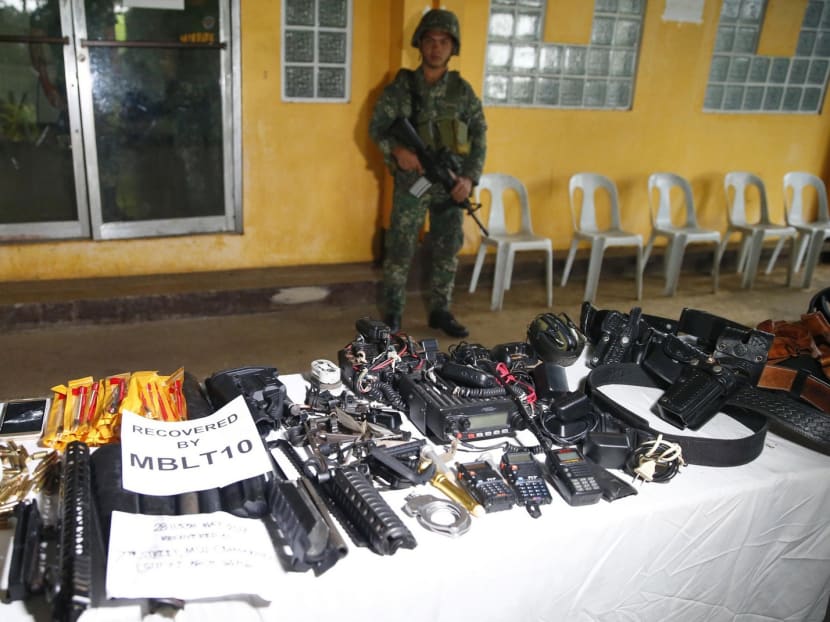Maute group planned Marawi attack before army moved in
MARAWI — Materials recovered by the Philippine authorities in Marawi City revealed that the attack of the pro-Islamic State (IS) Maute group had been planned even before the government’s operation to arrest Abu Sayyaf senior leader Isnilon Hapilon.

Some of the items recovered by the armed forces in Marawi City include high-powered firearms such as a 50-calibre machine gun, ammunitions, black IS-style flags, and materials that can be used to construct improvised explosive devices. Photo: AP
MARAWI — Materials recovered by the Philippine authorities in Marawi City revealed that the attack of the pro-Islamic State (IS) Maute group had been planned even before the government’s operation to arrest Abu Sayyaf senior leader Isnilon Hapilon.
“Indeed there was planning that was involved even prior to our entry to arrest Hapilon ... When we got information that he was holed up in the area,” said Philippine military spokesman Brigadier-General Restituto Padilla yesterday.
“The place has also been revealing lots of plans that indicate many of these activities had been planned long ago prior to our entry into the area.”
Brig-Gen Padilla said the armed forces recovered high-powered firearms and materials that can be used to construct improvised explosive devices.
However, the materials have yet to be assessed and studied.
He said that the Philippine military has information that Hapilon, who is on Washington’s list of most-wanted terrorists, is still inside Marawi and members of the terror group continue to hold some areas of the city.
A week-long assault by Islamist rebels in the southern Philippine city is being fuelled by stolen weapons and ammunition, and fighters who have broken out of jails, the military said yesterday, as troops battled militants resisting ground and air attacks.
The Maute group has proven to be a fierce enemy, clinging on to the heart of Marawi City through days of airstrikes on what the military called known rebel targets, defying expectations of a swift end to their occupation.
The military deployed for the first time SF-260 close-air-support planes to back attack helicopters and ground troops looking to box rebels into a downtown area. The army said the rebels hold about a tenth of the city.
The hardline Maute had kept up the fight with rifles and ammunition stolen from a police station, a prison, and an armoured police vehicle, and were using them to hold off troops, said Brig-Gen Padilla. The militants had freed jailed comrades to join the battle and opted to engage in urban warfare because the city had stocks of arms and ample supplies of food.
Philippine President Rodrigo Duterte is alarmed by the strength of the Maute and intelligence reports suggesting it has teamed up with other extremist groups and has recruited foreign fighters. He last week declared martial law on Mindanao island, where Marawi is located, in an attempt to quell movements he said he had long warned would mushroom into what is now an IS invasion.
Eighty-nine militants, 21 security personnel and 19 civilians have been killed in the clashes.
The slow pace of the military’s efforts to retake Marawi — with air support and far superior firepower than the rebels — has prompted questions about its strategy.
That has been compounded by social media images of smiling fighters with assault rifles posing on an armoured, United States-made police combat vehicle, dressed in black and wearing headbands typical of the IS.
Another picture showed a bearded man at the wheel of a police van flying an IS flag. The authenticity of the images has not been independently verified and the military has urged the public not to spread “propaganda”.
The military believe the Maute group staged the Marawi takeover to prove itself to the IS and to try to win its endorsement as its affiliate in South-east Asia.
Mr Duterte said he would not allow the IS to gain traction in the Philippines and inflict murder on the scale of Syria and Iraq.
He changed his mind on last week’s offer of dialogue with the Maute and said he “will not talk to terrorists”.
“They are trying to correct the way of living for everybody. They do it by killing people, invoking the name of God and that is a very terrible ideology,” he said of the IS. “It does not know anything except to waste human lives.”
Security experts believe extremists in the southern Philippines have quietly become better organised and funded, pointing to Maute’s rapid rise from obscurity.
The government yesterday said another rebel group, the Moro Islamic Liberation Front had agreed to help get civilians, dead or alive, out of Marawi and had accepted Mr Duterte’s unconventional offer for communists, separatists and the military to unite against radical Islam.
Congress held a special hearing yesterday on martial law, which minority bloc lawmakers said was an overreaction by Mr Duterte and a unilateral decision he made while overseas. But most legislators back the measure as being needed to meet the security threat. AGENCIES






